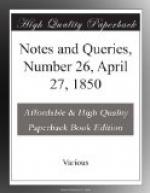Note.—Gutta Serena, commonly called glass-eye, is a species of blindness; the pupil is unusually dilated; it is immovable, bright, and glassy.
G.H. HEWIT OLIPHANT.
April 16. 1850.
Christ’s Hospital.—In reply to “NEMO” (No. 20. p. 318.), a contemporary of the eminent Blues there enumerated, informs him, that although he has not a perfect recollection of the ballads then popular at Christ’s Hospital, yet “NEMO” may be pleased to learn, that on making search at the Society of Antiquaries for Robin Hood Ballads, he found in a folio volume of Broadsides, &c., one of the much interest and considerable length in relation to that school. The Ballad must also be rare, as it is not among those in the two large volumes which have been for many years in the British Museum, nor is it in the three volumes of Roxburgh Ballads recently purchased for that noble library. {422}
The undersigned believes that the only survivor of the scholars at Christ’s Hospital mentioned by “NEMO,” is the Rev. Charles Valentine Le Grice, now residing at Trerieffe, near Penzance.
J.M.G.
Worcester, March 22. 1850.
[We are happy to say that one other, at least, of the Christ Hospital worthies enumerated by “NEMO” still survives—Mr. Leigh Hunt, whose kindly criticism and real poetic feeling have enriched our literature with so many volumes of pleasant reading, and won for him the esteem of a large circle of admirers.]
Tickhill, God help me! (No. 16. p. 247.).—“H.C. ST. CROIX” informs us that a similar expression is in use in Lincolnshire. Near to the town of “merry Lincoln” is a large heath celebrated for its cherries. If a person meets one of the cherry-growers on his way to market, and asks him where he comes from, the answer will be, if the season is favourable, “From Lincoln Heath, where should ’un?” but if, on the contrary, there is a scarcity of cherries, the reply will be, “From Lincoln Heath, God help ’un.”
“DISS” informs us, too, that this saying is not confined to Tickhill, Melverly, or Pershore, but is also current at Letton, on the banks of the Wye, between Hereford and Hay. And “H.C.P.” says the same story is told of the inhabitants of Tadley, in the north of Hampshire, on the borders of Berkshire.
Robert Long (No. 24. p. 382.).—Rear-Admiral Robert Long died 4th July, 1771, having been superannuated on the half-pay of rear-admiral some time before his death. His seniority in the navy was dated from 21st March, 1726, and he was posted in the Shoreham. He never was Sir Robert. An account of the charity he founded may be seen in the Commissioners’ Reports on Charities, vol. iii. iv. vi.
G.
Transposition of Letters (No. 19. p. 298.).—Instances of shortened names of places. Bensington, Oxfordshire, now called Benson; Stadhampton, Oxfordshire, now called Stadham; and in Suffolk the following changes have taken place; Thelnetham is called Feltam; Hoxney, Oxen.




